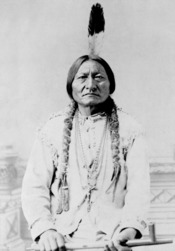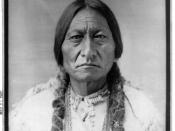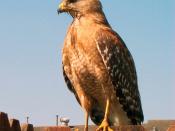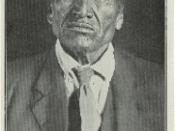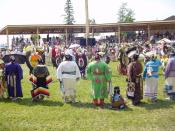When I was fairly young boy of about ten, I ran across a book titled Red Hawk. I immediately became engrossed into the tale and spent all of my free time devouring the words page by page. The story was a combination of fact and fiction. It followed the life of a young Indian boy named Red hawk from age ten to his tragic death in the Battle of the Bighorn. While it did follow the life of one character, it also demonstrated the plight of the Ogallala Sioux Indians during this time period. Being raised in the heart of the Big Horn Mountains, I have always been lured to the myths of the Indian culture. Equally, I was appalled by the white mans aggressive destruction of the Sioux Nation.
The beginning of the story tells of a young Red Hawk, playful, mischievous and yearning for his acceptance into the tribe as a man, and the challenge he must face do so.
The first hunt is a test of manhood. Red Hawk sets off on this adventure with both excitement and trepidation. To succeed brings him acceptance, to fail brings another year of being considered a mere boy. The hunt, the kill, and the celebration are portrayed in a way only a young boy also seeking acceptance can relate to. This was not unlike my first hunt. To succeed meant acceptance into manhood, to fail meant another year of boyhood. The bonds of our hunts were not to kill for the sake of killing but the taking of food for our survival.
The Ogallala Sioux were a people of the land. Not only did they reap their harvest from the land, they also were at peace with the land. All of their beliefs, lore, religion, and actions were based on an earthly premise. Their fear and respect were to the Gods of Wind, Fire, Rain, and the Earth. I was much attuned to their belief, take not from the land what you cannot return or cannot use. I learned in school of the near extinction of the Bison Buffalo when whites first entered the prairies of the west. Most disturbing was the fact that it was not for their meat to survive, but for their hide to prosper. The skinless bare animals were left to rot in the sweltering sun. I hung my head in shame at the senseless waste.
The story progressed to Red Hawks' rise to Chief of not only his tribe but also the entire Sioux Nation. The parallelism to today's political struggles is uncanny. The infighting, negotiating, and soothing of ruffled feathers was as prevalent then and as in any society as it is today. Wanting a life of peace Red Hawk sought a balanced life with the white man. He gave way to their settlement into Sioux land as much as the Sioux were still able to live an independent life. The white man took and took from the Sioux until they were pushed into a corner with almost all of their boundless land gone. I read in horror weighing against the fiction of the story Red Hawk to the facts I was learning in school. I began to despise the history and conquest my ancestors had in what we know today as America.
Pushed to the limit, no longer being able to support his people, Red hawk was faced with a decision that he knew would bring about the destruction of the Sioux nation. He must face off with the White Man. He gathered the entire Sioux Nation from its many reservations to the rolling hills at the base of the Big Horn mountain range in Montana. There he would face the White Man once and for all. The white army was led by a yellow haired General made famous during the great Indian Wars. The General was caught off guard, completely by surprise. His army wiped out, survivors slaughtered in anger and hate. Although a victory by the Sioux, the battle led to the demise of the Sioux Nation. The whites amassed a greater army and overpowered the Sioux bringing about their defeat. Additionally, they lost the greatest leader they had ever known, for Red Hawk died in the battle. I felt as if I had grown up with Red Hawk. I knew of his fears, emotions, and anxieties towards the advancing white race. I knew through school that these feelings were described in a true account. The story of Red Hawk was a fictional biography of the great Sioux Chief Sitting Bull. I again could only hang my head in shame. We destroyed a culture that was actually at balance with nature.
It has been over thirty years since I have read Red Hawk. Its impact on me still affects the manner in which I believe today. I am still a person of the earth. Take not from the land what you cannot return or cannot use is deeply imbedded into my beliefs. Being older and more mature does shed light on the fact it is not the destructiveness of the white man that is particularly portrayed in this story, but the destructiveness of man in general. There is not a culture, nation or country in history that has not been affected in the same way.
